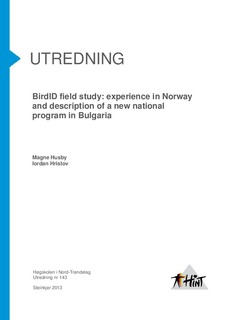BirdID field study: experience in Norway and description of a new national program in Bulgaria
Abstract
The BirdID field study at HiNT in Norway was conducted to increase the number of participants in the national breeding bird survey (BBS) and their skills in bird identification, and has been arranged yearly since 2006. In total, the students can get 25 intensive days outdoors in five separate gatherings. Besides, the students are also using the www.birdid.no website for further training, a website constructed for the same reason as the field study. Measurements of the skills of the students before and during the field study show a significant increase in their ability to recognize birds. Especially rapid progress was registered on their learning of bird songs and calls. The combination of the field study and the website has been successful in increasing the number of volunteers in the BBS. In the four counties closest to HiNT, 58% of the BBS routes were surveyed by BirdID students compared with only 11% in the other counties. Most of the students come from the counties closest to HiNT, but students are coming from all parts of Norway and even Sweden and Finland. Especially many medium skilled birders join the field study, and 74% of them also join the BBS. This is most probably a group of volunteers we never would have reached without this study.
There is a major challenge in Bulgaria to involve volunteers in the BBS, and to improve their skills. It is therefore intented to have a program in Bulgaria in 2013 similar to the Norwegian program. The BirdID in Bulgaria is adapted to the distribution of birds in Bulgaria, and the students’ economic situation. The Bulgarian model implies that the national organizer (NaO) will go to six different local areas and arrange field training there in cooperation with a local organizer, lasting three or four days each. The local organizer will in addition arrange at least four more sessions with the students. Besides these, there will be three national training locations that the students from the six local areas can join, lasting three days each. Each student will therefore have a minimum of 16 days together with teachers if they follow both the local and national program. This is less than in Norway, but the students’ progress will be followed by testing of their skills.
